八年级上Unit+3
- 格式:pptx
- 大小:1.92 MB
- 文档页数:39
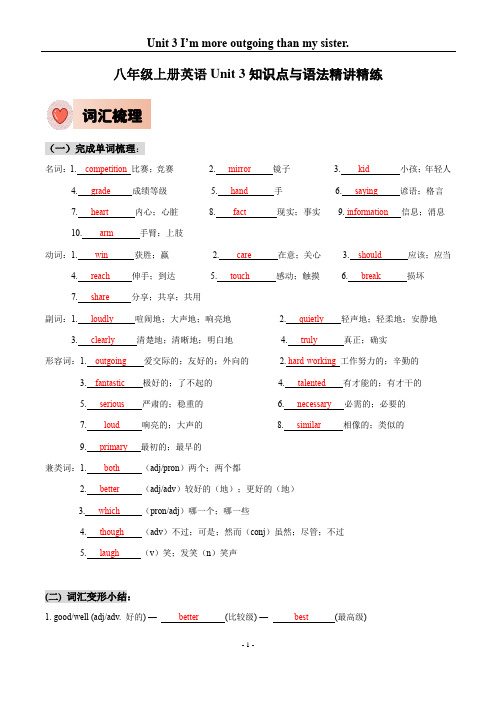
八年级上册英语Unit 3知识点与语法精讲精练词汇梳理(一)完成单词梳理:名词:1. competition比赛;竞赛 2. mirror 镜子 3. kid 小孩;年轻人4. grade 成绩等级5. hand 手6. saying 谚语;格言7. heart 内心;心脏8. fact 现实;事实9. information 信息;消息10. arm 手臂;上肢动词:1. win 获胜;赢 2. care 在意;关心 3. should 应该;应当4. reach 伸手;到达5. touch 感动;触摸6. break 损坏7. share 分享;共享;共用副词:1. loudly 喧闹地;大声地;响亮地 2. quietly 轻声地;轻柔地;安静地3. clearly 清楚地;清晰地;明白地4. truly 真正;确实形容词:1. outgoing 爱交际的;友好的;外向的 2. hard-working工作努力的;辛勤的3. fantastic 极好的;了不起的4. talented 有才能的;有才干的5. serious 严肃的;稳重的6. necessary 必需的;必要的7. loud 响亮的;大声的8. similar 相像的;类似的9. primary 最初的;最早的兼类词:1. both (adj/pron)两个;两个都2. better (adj/adv)较好的(地);更好的(地)3. which (pron/adj)哪一个;哪一些4. though (adv)不过;可是;然而(conj)虽然;尽管;不过5. laugh (v)笑;发笑(n)笑声(二) 词汇变形小结:1. good/well (adj/adv. 好的) — better (比较级) — best (最高级)2. loud (adj. 大声的) — loudly (adv.喧闹地)3. quiet (adj. 安静的) — quietly (adv. 安静地)4. competition (n. 竞争;比赛) — compete (v. 竞争;比赛)5. clearly (adv. 清楚地;清晰地) — clear (adj. 清楚的;清晰的)6. win (v. 赢;获胜) — won (过去式) — winner (n. 获胜者)7. talented (adj. 有才能的) — talent (n. 才能;天赋)8. truly(adv. 真正;确实) — true (adj. 真正的) — truth (n. 真实;真相)9. care(v. 在意;关心) — careful (adj. 认真的;细心的)10. serious(adj. 严肃的;稳重的) — seriously (adv. 严重地;严肃地)11. say(v. 说) — saying (n. 谚语;格言)12. touch(v. 感动;触摸) — touching (adj. 令人感动的) — touched (adj. 感动的)13. break(v. 破坏) — broke (过去式)【练一练】用所给词的适当形式填空1.Class Six won (win) the basketball game but our class lost the game.2.My friend likes telling jokes. He often makes us laugh (laugh)happily.3.Be quiet (quietly)! I have something important to tell you.4.I think Linda dances better (well) than Kate.5.Students can’t speak loudly (loud) in the library.6.Although he is only two years old, he can speak clearly (clear).7.The teacher told us to find out some information (information)about our country and share it next week.8.I’m truly (true) sorry that things had to end like this.st night we saw a movie and it made us touched (touch).10.I don't think differences (different) are important in a friendship.(三) 短语攻关:care about关心;在意be talented in 在……有天赋both...and...……和……都play the drums 敲鼓the singing competition 歌唱比赛be similar to 与……相像的bring out 使显现the same as 和……相同be different from与……不同as long as 只要in fact 事实上primary school 小学get good grades 取得好成绩have fun doing sth 做某事很开心make sb do sth 让某人做某事want to do sth 想要做某事make friends 交朋友be like 像……一样知识点梳理1.Both Sam and Tom can play the drums, but Sam plays them better than Tom. 萨姆和汤姆都会敲鼓,但是萨姆比汤姆敲得好。

八上英语第三单元讲解
八年级上册英语第三单元主要涉及课文《A trip to the countryside》和相关的语法、词汇和口语表达。
下面将对该单元的主要内容进行讲解。
1.课文理解
《A trip to thecountryside》是一篇关于小明和他的父母去乡村旅行的故事。
通过这篇课文,学生可以了解到乡村风景的美丽和不同的活动,以及人们在乡村的生活方式。
同时,还能学习到关于问路、描述地点等实用的英语表达。
2.重点词汇
-countryside:乡村
-village:村庄
-farm:农场
-river:河流
-bridge:桥梁
-field:田地
-hill:小山
-tree:树木
-flower:花朵
-beautiful:美丽的
-peaceful:安静的
3.语法知识
本单元的语法重点主要是介词短语的使用。
学生需要掌握一些常见的介词如in、on、at、by等,并了解它们在描述地点、时间和交通方式等方面的应用。
4.口语表达
通过课文和练习,学生可以学习到一些实用的口语表达,如问路、描述地点和谈论活动等。
学生应该积极参与口语练习,提高自己的口语交流能力。
5.阅读技巧
在阅读课文时,学生可以运用一些阅读技巧来更好地理解文章的内容。
例如,通过预测标题和主题,抓住关键词和句子,注意上下文的线索和暗示等。
同时,还需要培养快速阅读和理解的能力。
以上是对八年级上册英语第三单元的主要内容进行讲解。
希望对你有所帮助!如果有其他问题,欢迎继续提问。

八年级上册英语unit三知识点总结在八年级上册英语课程中,unit三是一个重要的单元。
本文将总结unit三的主要知识点,包括语法、词汇和阅读理解等方面。
一、语法1.现在进行时现在进行时表示现在正在进行的动作。
构成:be+现在分词(-ing)。
如:I am reading a book.(我正在看书。
)2.一般将来时一般将来时表示将来的动作或状态。
构成:will+动词原形。
如:I will go shopping tomorrow.(我明天去购物。
)约定时间或计划安排时用现在进行时+表示将来时间。
如:We are meeting at six tomorrow evening.(我们明天傍晚六点见面。
)3.被动语态被动语态表示动作的承受者,通常情况下使物体作主语,谓语动词用be+过去分词(-ed)。
如:The book was written by him.(这本书是他写的。
)二、词汇1.常见动词play(玩)、walk(散步)、jog(慢跑)、cycle(骑自行车)、swim(游泳)、dance(跳舞)、sing(唱歌)、listen(听)、draw(画画)、read(读)、write(写)、speak(说话)、learn (学习)、teach(教)、watch(看)等。
2.常见地点school(学校)、park(公园)、cinema(电影院)、library (图书馆)、supermarket(超市)、hospital(医院)、museum (博物馆)、post office(邮局)等。
3.常见习惯描述词汇always(总是)、usually(通常)、often(经常)、sometimes (有时)、not often(不经常)、hardly ever(很少)、never(从不)等。
三、阅读理解本单元阅读理解主要涉及四则运算和图表解释,详见教材P39和P40。
四、写作本单元写作主要涉及书信和短文。
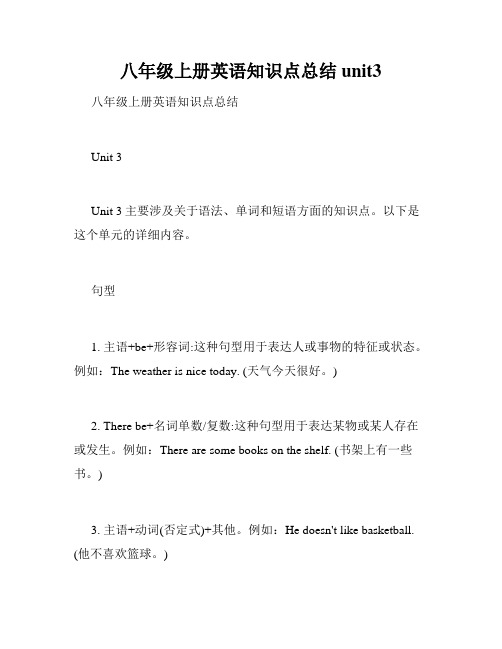
八年级上册英语知识点总结unit3八年级上册英语知识点总结Unit 3Unit 3主要涉及关于语法、单词和短语方面的知识点。
以下是这个单元的详细内容。
句型1. 主语+be+形容词:这种句型用于表达人或事物的特征或状态。
例如:The weather is nice today. (天气今天很好。
)2. There be+名词单数/复数:这种句型用于表达某物或某人存在或发生。
例如:There are some books on the shelf. (书架上有一些书。
)3. 主语+动词(否定式)+其他。
例如:He doesn't like basketball. (他不喜欢篮球。
)4. 动词+宾语+间接宾语:这种句型用于表达给某人或某物做某事。
例如:I bought her a gift. (我给她买了一份礼物。
)时态1. 现在完成时:这种时态用于表达从过去某个时间点持续到现在的时间。
例如:I have read this book before. (我以前读过这本书。
)2. 现在完成进行时:这种时态用于表达从过去某个时间点开始持续到现在一直在进行的某个动作。
例如:I have been studying English for eight years. (我已经学了英语八年。
)单词和短语1. 词汇: 这个单元主要涉及关于天气和自然界的词汇,如:cloudy, sunny, rainy, windy (云,阳光,雨,有风). 另外,也包括其他主题的词汇如:wool, cotton, leather, clothes, bag (羊毛,棉花,皮革,衣服,袋子).2. 短语: 一些常用短语也在这个单元讨论,比如:take photos, go skiing, go fishing, go hiking, take a walk (拍照,滑雪,钓鱼,远足,散步).以上便是八年级上册英语知识点总结unit3的全部内容。

八上Unit3知识点(一)1.八上单元知识点副词(1)副词:修饰动词、形容词、副词的程度的词①直接+ly:careless ['keələs] --carelessly ['keələsli] 粗心的different-differently 不同的quiet ['kwaiət] -quietly ['kwaiətli] 安静的helpful-helpfully有帮助的·······:②变le为ly(除:whole-wholly)terrible['terəbl]---terribly ['terəbli]可怕的simple['simpl] --simply ['simpli] 简单的possible ['pɔsəbl] -possibly ['pɔsəbli]可能的comfortable ['kʌmftəbl] -comfortably ['kʌmftəbli] 舒适的·······③变y为i +ly:(除了:shy-shyly害羞的、dry [drai] -dryly干燥的、sly [slai] --slyly [slaili] 狡猾的)easy['i:zi] -easily ['i:zəli] 容易的noisy ['nɔizi] -noisily['nɔizili] 喧闹的happy ['hæpi] -happily ['hæpili] 开心的heavy['hevi] -heavily ['hevili]沉的,肥的healthy['helθi]-healthily['helθili]健康的·······④以e结尾直接+ly除true-truly due[dju:] -duly[dju:li]理应的,适当的polite-politely礼貌的wide [waid] -widely宽广的wise [waiiz] --wisely [waiizli] 英明的,明智的nice-nicely美好的·······⑤形副同形hard-hard far-far early-early late-late alone-alone[ə'ləʊn]单独的fast-fast straight-straight [streit] 直的high-high⑥无副词形式的:2.八上单元知识点比较级(1)定义:形容词、副词的比较级用于两者之间的比较,意思是前者比后者更···的(2)构成:①直接+er: short-shorter、tall-taller new-newer fast-faster ·······②直接加r (字母e,结尾) fine-finer late-later nice-nicer large-larger·······③双写末字母+er:重读闭音节(辅元辅结构)的词语记忆方法:令人高兴(glad-gladder)的是:湿(wet-wetter)热(hot-hotter胖(fat-fatter)、瘦(thin-thinner)悲哀(sad-sadder)大(big-bigger)红(red-redder)苗(slimmer)④辅音字母+y,变y为i加erhealthy-healthier健康的early-earlier happy-happier easy-easier ⑤前加more的More1: ing或ed 结尾的形容词变比较级前面+moreoutgoing['aʊtɡəʊiŋ]开朗的hard-working 刻苦努力的interesting ['intrəstiŋ]—interested ['intrəstid] (有趣的)surprising [sə'praiziŋ] --surprised [sə'praizd] (惊讶的)relaxing [ri'læksiŋ]—relaxed [ri'lækst] (放松的)boring-bored(枯燥的) tiring ['ta iər iŋ]—tired ['taiəd] (劳累的) exciting—excited(刺激的) talented ['tæləntid]有才能的·······More2:形容词后+ly 变成副词的前面+morequickly快的carefully 小心的quietly['kwaiətli] 安静的seriously ['sɪəriəsli]严肃的 happily 快乐的luckily 幸运的·······注意:friendly—friendlier lovely—lovelier lonely ['ləʊnli] --- lonelier ['ləʊnliə] More3:多音节词和部分双音节词(1)7个字母以及7个字母以下的词语:比较级加more的顺口溜:现代流行怕细心modern ['mɔdn]popular['pɔpjələ] afraid[ə'freid]careful['keəfl]严紧(紧张的)诚实用耐心serious ['siəriəs] nervous[ˈnɜ:vəs]honest ['ɔnist] useful(或useless) patient ['peiʃnt]经常(正常的)(常见的)积极有帮助often['ɔfn] normal[ˈnɔ:ml] common/kɔmən/ active ['æktiv]helpful(helpless)基本出名古得开自然无害地加fun和upset (沮丧的)basic ['beisik] 、famous、ancient[ˈe inʃənt]open ['əʊpən] natural[ˈnætʃrəl]harmless (harmful)fun upset (2)8个字母以及8个字母以上的词的比较级全部加more ⑥不规则的特殊记忆well -----better bad或badly--------worse ][wə:s] little—----less far---—farther或further['fə:ðə] 更远的八上单元知识点①“····比较级than····”:····比···“···数字times+比较级+than····”:···是···的几倍(一倍once两倍twice+times)···比较级than any other + 单数名词:比其他任何都··今早我起得比我妈早。

八年级上册人教版英语unit3知识点Unit3主要讲述了有关时间和计划的相关表达。
本篇文章将为大家归纳整理Unit3中的主要知识点,帮助大家更好地学习和掌握英语。
I. 时间的表达1. 时间的基本表达:- 时间数字+时间单位:例如:8:00 (eight o'clock)、3:15 (three fifty)。
- a.m./p.m.:英语中用a.m.表示上午,p.m.表示下午。
例如:9:00a.m.(nine o'clock in the morning)、7:30p.m.(seven thirty at night)。
2. 时间段的表达:- 表示时间段的连词有:from…to/ between…and/ from…till/ between…and/ from… until等,例如:from 9:00 to 11:00/ between 1:00 and 3:00/ from Monday to Friday。
- 时间段的表达还可以用“… past…” 和“to…”来表示时间段的前后两个端点,例如:It's twenty-five past nine。
It's a quarter to ten。
3. 时间表达中常用的词汇:- minute(分钟)/hour(小时)/day(天)/week(周)/month (月)/year(年)- date(日期)/weekend(周末)/weekday(工作日)/holiday(假期)/vacation(假期)II. 计划的表达1. 表示计划的常用句型:- What are you going to do…? 你打算做什么?- I'm going to… 我打算……- I'm not going to… 我不打算……- What's your plan for…? 你什么时候做什么?- My plan for… is… 我计划在……做……2. 常见的时间状语和频率副词:- tomorrow(明天)/next Monday(下周一)/next month(下个月)/next year(明年)- once a week(每周一次)/twice a month(每月两次)/three times a year(每年三次)- on weekends(在周末)/in the evening(在晚上)/in the morning(在早上)- every day(每天)/always(总是)/sometimes(有时)/never (从不)III. 阳历和阴历的表达1. 阳历的表达:阳历是指以地球绕太阳运行一周为一年的历法,一般是指公历。

八年级上册英语Unit3重点归纳Embarking on our exploration of Unit 3 in Grade Eight English, we dive into a world brimming with exciting topics and essential language skills. This unit offers us not just vocabulary but also cultural insights and opportunities to hone our communication abilities. Let's delve right in!Key Vocabulary Spotlight: The cornerstone of any language learning journey is its vocabulary. In this unit, expect to encounter words that paint vivid pictures –adjectives like 'spectacular', verbs like 'wanderlust-inducing', and nouns such as 'historical landmarks'. Master these word gems and you'll find yourself weaving tales full of charm and depth.Grammar Gems for Enhancement: Grammar holds the key to unlocking the intricacies of English expressions. Here, we focus on present perfect tense and its wonders in narrating past experiences up until now ("I have visited five countries so far."). Embracing this tense enriches your storytelling capabilities, making each account come alive with precision and clarity.Cultural Insights Galore:Beyond mere linguistic pursuits, Unit 3 takes us on virtual tours across continents, immersing us in diverse cultures. From the bustling streets of Rome to the serene temples of Asia, every page whispers stories of heritage, customs, and traditions. Engage deeply with these narratives; let them broaden your horizons beyond textbooks.Reading Comprehension Skills Boost:Reading passages carefully crafted around our theme encourage critical thinking and deeper understanding. As you navigate through articles discussing famous monuments or biographical sketches, practice skimming for main ideas and scanning for details. Sharpen your comprehension skills by summarizing what you read aloud –it helps solidify knowledge within.Speaking & Writing Opportunities Abound:Practice makes perfect, especially when honing oral and written fluency. Group discussions centered around cultural differences or debates about conservation efforts foster confidence while enhancing vocabulary application. Don't shy away from penning essays exploring personal connections to historical sites; they are windows to your thoughts and emotions.In conclusion, Unit 3 presents a smorgasbord of treasures waiting to be uncovered. By mastering its core vocabulary, grasping essential grammar rules, soaking up cultural nuggets, boosting reading comprehension, and embracing speaking and writing challenges, you'll emerge stronger, more knowledgeable, and ready to embark on further adventures in English learning. So, gear up and embrace all that awaits you in this fascinating unit!。

八年级上册英语unit3单词表人教版八年级上册英语Unit 3单词表。
一、outgoing [ˈaʊtɡəʊɪŋ] adj. 外向的。
1. 例句:My sister is very outgoing.(我的姐姐非常外向。
)二、better [ˈbetə(r)] adj. & adv. (good和well的比较级)较好的(地);更好的(地)1. 例句:You can do better next time.(下次你能做得更好。
)三、loudly [ˈlaʊdli] adv. 喧闹地;大声地;响亮地。
1. 例句:Don't talk so loudly in the library.(不要在图书馆这么大声说话。
)四、quietly [ˈkwaɪətli] adv. 轻声地;轻柔地;安静地。
1. 例句:She left the room quietly.(她安静地离开了房间。
)五、hard - working [ˌhɑː d ˈwɜːkɪŋ] adj. 工作努力的;辛勤的。
1. 例句:My father is a hard - working man.(我的父亲是一个辛勤工作的人。
)六、competition [ˌkɒmpəˈtɪʃn] n. 比赛;竞赛;竞争。
1. 例句:There will be a singing competition next week.(下周将有一场歌唱比赛。
)七、fantastic [fænˈtæstɪk] adj. 极好的;了不起的。
1. 例句:The movie is fantastic.(这部电影棒极了。
)八、which [wɪtʃ] pron. & adj. 哪一个;哪一些。
1. 例句:Which book do you like?(你喜欢哪一本书?)九、clearly [ˈklɪəli] adv. 清楚地;清晰地;明白地。

仁爱版八年级上册unit3知识点Unit 3主要介绍了关于家庭的词汇和短语及其用法,包括家庭成员、家庭活动、家庭用品等。
本文将对本单元中的重点知识点进行详细介绍。
一、家庭成员1. Parents:父母Parents是指父母双亲。
当你想要介绍你自己的父母时,你可以说My parents。
在英文短文中,如果出现下列介绍者的句子,也可用parents。
例句:I live with my parents.2. Grandparents:祖父母Grandparents是指祖父母,包括father's parents(爷爷新婚、爷爷、奶奶);mother's parents(外公、外婆)。
例句:I often visit my grandparents.3. Uncle:叔叔/伯伯Uncle可以指叔叔或者伯伯。
在英文中没有明显的区分,只有伯伯(父亲兄弟)、叔叔(父亲弟弟)。
例句:My uncle lives in Canada.4. Aunt:阿姨/伯母Aunt是指阿姨或者伯母,和Uncle一样,并没有明显的区分。
需要根据实际情况进行判断。
例句:My aunt is a teacher.二、家庭活动1. Have a picnic:去野餐Have a picnic是指去外面野餐。
这是一个很好的家庭活动,你可以和家人一起享受阳光和大自然。
例句:We are going to have a picnic this weekend.2. Play board games:玩桌游在家里玩桌游也是一个很好的家庭活动。
这可以增加家庭成员之间的互动,并且在享受游戏的同时,还可以提高智力。
例句:We often play board games on Saturday nights.3. Watch TV:看电视在家里看电视是很多家庭成员都喜欢的活动。
不过需要注意的是,如果看电视时间过长,会影响家庭成员之间的交流。
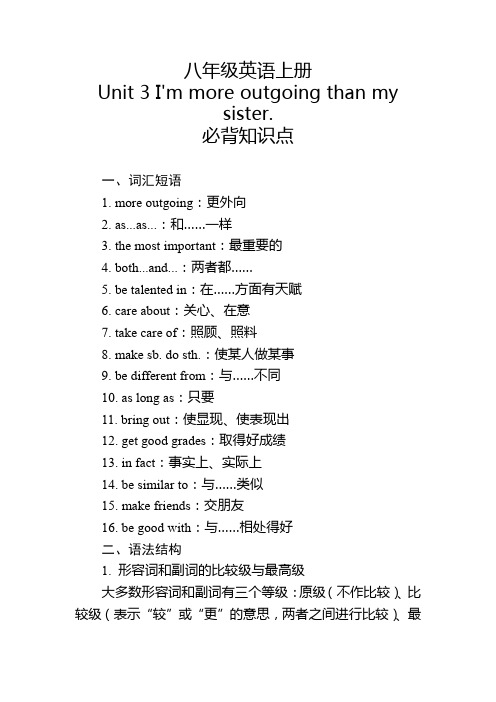
八年级英语上册Unit 3 I'm more outgoing than mysister.必背知识点一、词汇短语1. more outgoing:更外向2. as...as...:和……一样3. the most important:最重要的4. both...and...:两者都……5. be talented in:在……方面有天赋6. care about:关心、在意7. take care of:照顾、照料8. make sb. do sth.:使某人做某事9. be different from:与……不同10. as long as:只要11. bring out:使显现、使表现出12. get good grades:取得好成绩13. in fact:事实上、实际上14. be similar to:与……类似15. make friends:交朋友16. be good with:与……相处得好二、语法结构1. 形容词和副词的比较级与最高级大多数形容词和副词有三个等级:原级 (不作比较)、比较级 (表示 “较”或 “更”的意思,两者之间进行比较)、最高级(表示“最”的意思,三者或三者以上作比较)。
比较级和最高级的构成有规则变化和不规则变化两种。
规则变化的通常在单音节词和以er、ow、ble、y结尾的双音节词末尾加-er构成比较级,加-est构成最高级;以其他双音节和多音节结尾的在其前加more构成比较级,加most构成最高级。
不规则变化的比较级和最高级需要特殊记忆,如good/well-better-best,bad/badly-worse-worst等。
2. “as...as...”结构用于表示两者在某方面相同或相似,中间用形容词或副词的原级。
否定形式为 “not as/so...as...”,表示 “不如……”。
3. “more...than...”结构用于比较两者在某方面的差异,表示“比……更……”。
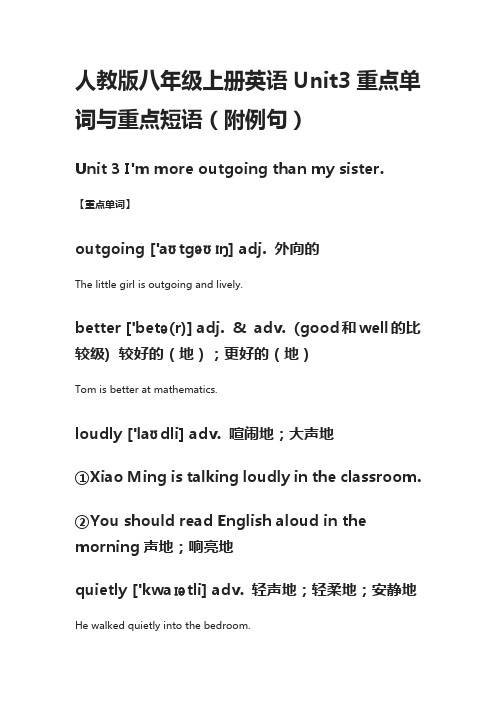
人教版八年级上册英语Unit3重点单词与重点短语(附例句)Unit 3 I'm more outgoing than my sister.【重点单词】outgoing ['aʊtɡəʊɪŋ] adj. 外向的The little girl is outgoing and lively.better ['betə(r)] adj. & adv. (good和well的比较级) 较好的(地);更好的(地)Tom is better at mathematics.loudly ['laʊdli] adv. 喧闹地;大声地①Xiao Ming is talking loudly in the classroom.②You should read English aloud in the morning声地;响亮地quietly ['kwaɪətli] adv. 轻声地;轻柔地;安静地He walked quietly into the bedroom.hard-working [ˌhɑː(r)d'wɜːkɪŋ] adj. 工作努力的;辛勤的He is a hard-working girl.Xiao Ming is a hard-working worker.competition [ˌkɒmpə'tɪʃn], [ˌkɑːmpə'tɪʃn] n. 比赛;竞赛;竞争There will be a math competition in our school tomorrow.I won the first prize in the painting competition.fantastic [fæn'tæstɪk] adj. 极好的;了不起的You look fantastic in that dress.你穿那件连衣裙真好看。

八年级上册unit3知识点总结八年级上册英语的第三单元主要介绍了谈论过去的事情和过去的时间的语法知识点。
在本单元中,我们学习了动词的过去式和一些表示过去时间的时间状语。
下面让我们来详细了解这些知识点。
一、动词的过去式1.规则动词过去式的构成规则动词的过去式通常是在动词末尾加上-ed。
例如,work的过去式是worked,play的过去式是played。
2.不规则动词过去式的构成不规则动词的过去式是没有规律可循的,需要通过记忆来掌握。
例如,go的过去式是went,eat的过去式是ate,see的过去式是saw等。
3.动词过去式的用法动词的过去式用来表示过去发生的动作或状态。
例如,I danced with my friend yesterday.(昨天我和我的朋友跳了舞。
)二、时间状语1.表示过去时间的时间状语在谈论过去的事情时,我们需要使用一些表示过去时间的时间状语来帮助说明。
例如,yesterday(昨天),last night(昨晚),ago(以前)等。
2.表示将来时间的时间状语在谈论未来的事情时,我们需要使用一些表示将来时间的时间状语。
例如,tomorrow(明天),next week(下周),in the future(将来)等。
3.时间状语的位置时间状语可以放在句首或句尾。
例如,Yesterday, I went to the park.(昨天,我去了公园。
)I went to the park yesterday.(我昨天去了公园。
)三、过去式的否定形式1.规则动词过去式否定形式的构成规则动词的过去式否定形式通常是在动词前加did not或didn’t。
例如,I didn’t play basketball yesterday.(昨天我没有打篮球。
)2.不规则动词过去式否定形式的构成不规则动词的过去式否定形式是在动词前加did not或didn’t,并且不需要改变动词本身的形式。
例如,She didn’t eat breakfastthis morning.(今天早上她没有吃早餐。

八年级英语上册-人教版-Unit 3 说课稿(1)一. 教材分析人教版八年级英语上册Unit 3的主题是“My hero”,通过介绍英雄人物,让学生学会表达人物的特征、外貌、喜好等。
本单元的词汇和句子结构较为复杂,学生需要掌握一些形容词和副词来描述人物。
此外,本单元还涉及到了过去进行时态的用法。
二. 学情分析八年级的学生已经掌握了英语学习的基本语法和词汇,但部分学生在口语表达和写作方面还存在困难。
针对这一情况,教师在教学过程中要注重培养学生的口语表达能力和写作能力,同时激发学生的学习兴趣。
三. 说教学目标1.知识目标:学生能够掌握本课的生词、短语和句型,学会用英语描述人物的外貌、特征和喜好。
2.能力目标:学生能够运用所学知识进行口语交流和写作,提高英语实际运用能力。
3.情感目标:通过学习本单元,学生能够激发对英雄人物的敬仰之情,培养正确的价值观。
四. 说教学重难点1.重点:本课的生词、短语和句型。
2.难点:过去进行时态的用法以及如何用英语描述人物的外貌、特征和喜好。
五. 说教学方法与手段1.采用任务型教学法,让学生在完成任务的过程中运用所学知识。
2.运用多媒体教学手段,如图片、视频等,直观地展示人物形象,激发学生的学习兴趣。
3.小组讨论,鼓励学生积极参与,提高口语表达能力。
4.注重个体差异,给予学生个性化的指导和反馈。
六. 说教学过程1.导入:展示一些英雄人物的照片,让学生猜测并介绍这些人物。
2.新课呈现:通过图片和视频,展示本课的生词、短语和句型。
3.学生讨论:分组讨论,用英语描述自己喜欢的英雄人物。
4.口语练习:学生模拟介绍英雄人物,其他学生进行评价。
5.写作练习:让学生写一篇关于自己喜欢的英雄人物的短文。
6.课堂小结:总结本课所学内容,强调重点。
7.作业布置:让学生完成课后练习,巩固所学知识。
七. 说板书设计板书设计要简洁明了,突出本课的重点。
可以设计如下板书:Unit 3 My hero1.生词:hero, brave, kind, smart, doctor, nurse, artist, musician, athlete,champion2.短语:be famous for, have a good sense of humor, be strict with, workhard3.句型:How would you describe a hero?What does he/she look like?What does he/she like to do?八. 说教学评价1.口语评价:评价学生在课堂上的口语表达能力和参与程度。

八年级上册英语Unit3重点内容总结
本文档总结了八年级上册英语Unit3的重点内容,包括以下几个方面:
1. 生活常识与交际能力
- 学会介绍自己和他人的姓名、年龄、国籍等基本信息。
- 学会询问他人的姓名、年龄、国籍等基本信息。
- 学会进行简单的问候和告别。
- 学会感谢他人的帮助,并用适当的方式回应。
2. 日常活动与爱好
- 学会用英语描述日常活动,如看电视、听音乐、踢足球等。
- 学会用英语询问他人的日常活动与爱好。
- 学会用英语表达自己的日常活动与爱好。
3. 学校生活与课程
- 学会用英语描述学校生活,如上课、做作业、参加活动等。
- 学会用英语表达对不同课程的喜好和不喜好。
- 学会用英语询问他人对不同课程的喜好和不喜好。
4. 人物介绍与家庭关系
- 学会用英语简要介绍他人的基本信息,如姓名、年龄、兴趣等。
- 学会用英语描述他人与自己的家庭关系,如父母、兄弟姐妹等。
5. 个人观点与喜好
- 学会用英语表达自己的观点和喜好,如对电影、运动、食物等的喜好。
- 学会用英语询问他人的观点和喜好。
以上是八年级上册英语Unit3的重点内容总结,希望对大家的研究有所帮助。


完整版)人教版八年级上册英语unit3知识点及习题Unit 3: I'm XXXIn this unit。
we will learn how to compare people and XXX.One important phrase is "XXX," XXX than another person。
We can use "as。
as" to compare two things and say they are the same。
For example。
"I am as outgoing as my best friend."We can also use "be similar to" to XXX。
For instance。
"The new movie is similar to the old one." On the other hand。
we use "be different from" to describe things that are not alike。
For example。
"My car is different from yours."When we care about someone。
we show interest in their feelings and well-being。
We can say "I care about my family andfriends." XXX。
For example。
"My sister is like a mirror because she copies everything I do."XXX is to be yourself and not compare yourself to others。

八年级上册unit3单词八年级上册 Unit 3 单词一、重点单词1. outgoing [ˈaʊtɡəʊɪŋ] adj. 外向的2. better [ˈbetə(r)] adj. & adv. (good 和 well 的比较级)较好的(地);更好的(地)3. loudly [ˈlaʊdli] adv. 大声地;高声地;花俏地4. quietly [ˈkwaɪətli] adv. 安静地;悄悄地;平静地5. hard-working [ˌhɑːd ˈwɜːkɪŋ] adj. 工作努力的;辛勤的6. competition [ˌkɒmpəˈtɪʃn] n. 比赛;竞赛;竞争7. fantastic [fænˈtæstɪk] adj. 极好的;了不起的8. which [wɪtʃ] pron. & adj. 哪一个;哪一些9. clearly [ˈklɪəli] adv. 清楚地;清晰地;明白地10. win [wɪn] v. (won,won)获胜;赢;赢得二、拓展单词1. talented [ˈtæləntɪd] adj. 有才能的;有天赋的2. truly [ˈtruːli] adv. 真正;确实3. care [keə(r)] v. 在意;担忧;关心 n. 小心;照料4. serious [ˈsɪəriəs] adj. 严肃的;稳重的5. mirror [ˈmɪrə(r)] n. 镜子6. kid [kɪd] n. 小孩;年轻人7. as long as 只要;既然8. necessary [ˈnesəsəri] adj. 必需的;必要的9. be different from 与……不同;与……有差异10. both [bəʊθ] adj. & pron. 两个;两个都三、单词用法1. outgoing作形容词,意为“外向的”,其比较级为 more outgoing,最高级为the most outgoing。
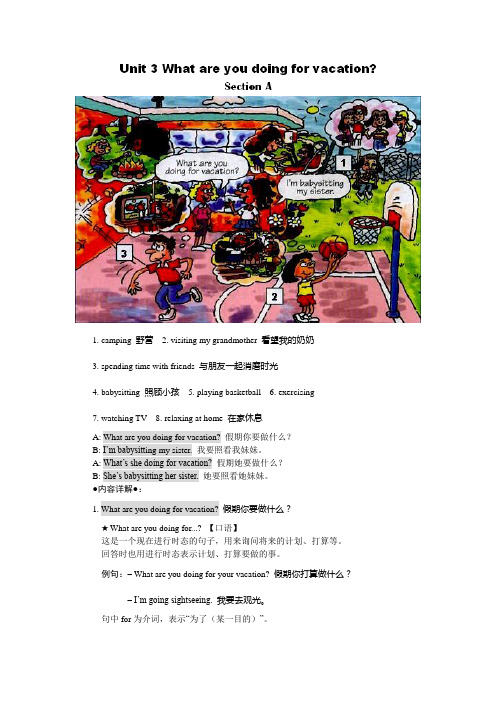
1. camping 野营2. visiting my grandmother 看望我的奶奶3. spending time with friends 与朋友一起消磨时光4. babysitting 照顾小孩5. playing basketball6. exercising7. watching TV 8. relaxing at home 在家休息A: What are you doing for vacation? 假期你要做什么?B: I’m babysitt ing my sister. 我要照看我妹妹。
A: What’s she doing for vacation?假期她要做什么?B: She’s babysitting her sister.她要照看她妹妹。
●内容详解●:1. What are you doing for vacation? 假期你要做什么?★What are you doing for...? 【口语】这是一个现在进行时态的句子,用来询问将来的计划、打算等。
回答时也用进行时态表示计划、打算要做的事。
例句:– What are you doing for your vacation? 假期你打算做什么?–I’m going sightseeing. 我要去观光。
句中for为介词,表示―为了(某一目的)‖。
例句:He went to Japan for the holiday. 他去日本度假了。
She is coming for it. 她要来取它。
※vacation【美】和holiday【英】都指假期,vacation尤指学校假期。
我要照看我妹妹。
★本句为现在进行时表达将来要做的事情。
★be+doing结构在本句中表示按计划即将发生的动作,常用于表示位置转移的动词,如:go,come,leave,start,arrive,move等。
例句:We are leaving on Friday. 我们将在星期五出发。

八年级上册英语unit3单词知识点本文将为大家总结八年级上册英语Unit3的单词知识点,包括基本词汇、扩展词汇、短语和句型等方面。
希望能够帮助同学们更好地掌握英语单词,提高英语水平。
一、基本词汇1. future: n. 将来;adj. 未来的2. magazine: n. 杂志3. grade: n. 年级;v. 打分4. aunt: n. 姑妈;伯母5. uncle: n. 叔叔;舅舅6. abroad: adv. 在国外7. expensive: adj. 昂贵的8. hope: v. 希望;n. 希望9. surprise: v. 使惊讶;n. 惊喜10. beach: n. 海滩二、扩展词汇1. foreign: adj. 外国的2. exam: n. 考试3. cheerful: adj. 愉快的4. colorful: adj. 多彩的5. impatient: adj. 不耐烦的6. thrilled: adj. 激动的7. relaxed: adj. 放松的8. traditional: adj. 传统的9. successful: adj. 成功的三、短语1. be interested in: 对......感兴趣2. be worried about: 担心......3. be fond of: 喜欢......4. look forward to: 期待......5. give up: 放弃......6. be excited about: 对......感到兴奋7. make friends with: 和......交朋友8. have fun: 玩得开心9. take a trip: 去旅行四、句型1. What are you going to do this weekend?2. I'm going to visit my aunt.3. How was your summer vacation?4. It was great! I went to the beach and had lots of fun.5. What do you think of this magazine?6. I think it's very interesting and informative.7. Why are you so excited?8. Because I'm going to have a trip abroad next month.以上就是八年级上册英语Unit3的单词知识点总结。

八年级上册unit3单词表一、more outgoing [mɔː(r) ˈaʊtɡəʊɪŋ] adj.(形容词)更外向的;更友好的。
1. outgoing [ˈaʊtɡəʊɪŋ] adj. 爱交际的;友好的;外向的。
2. both [bəʊθ] adj. & pron.(形容词和代词)两个;两个都。
3. better [ˈbetə(r)] adj. & adv.(形容词和副词)较好的(地);更好的(地)4. loudly [ˈlaʊdli] adv.(副词)喧闹地;大声地;响亮地。
5. quietly [ˈkwaɪətli] adv.(副词)轻声地;轻柔地;安静地。
6. hard - working [ˌhɑː d ˈwɜːkɪŋ] adj.(形容词)工作努力的;辛勤的。
7. competition [ˌkɒmpəˈtɪʃn] n.(名词)比赛;竞赛;竞争。
8. fantastic [fænˈtæstɪk] adj.(形容词)极好的;了不起的。
9. which [wɪtʃ] pron. & adj.(代词和形容词)哪一个;哪一些。
10. clearly [ˈklɪəli] adv.(副词)清楚地;清晰地;明白地。
11. win [wɪn] v.(动词)获胜;赢;赢得。
12. though [ðəʊ] adv.(副词)不过;可是;然而。
13. talented [ˈtæləntɪd] adj.(形容词)有才能的;有才干的。
14. truly [ˈtruːli] adv.(副词)真正;确实。
15. care [keə(r)] v.(动词)在意;担忧;关心。
16. care about 关心;在意。
17. serious [ˈsɪəriəs] adj.(形容词)严肃的;稳重的。
18. mirror [ˈmɪrə(r)] n.(名词)镜子。